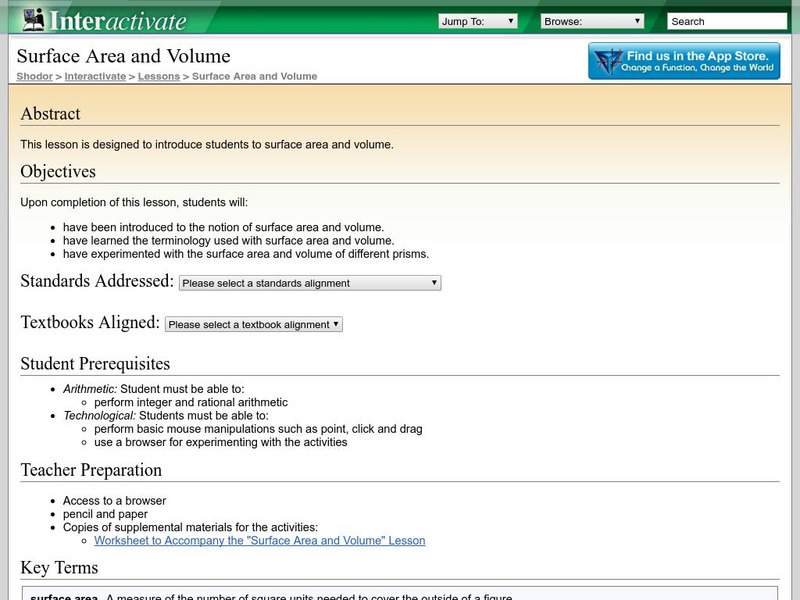Hi, what do you want to do?
Curated OER
Float My Boat
Fourth graders, in groups, experiment with density and the displacement of water by creating and designing their own boats and seeing which boat holds the most centimeter cubes without sinking..
Curated OER
Pyramids on Parade/Nets
Learners sketch the shape of three dimensional pyramids using nets. For this geometry lesson, students differentiate a pyramid from other three dimensional shape. They define the attributes of pyramids.
Curated OER
Get the Turtle to the Pond
Students solve problems. In this math lesson, students write solutions using LOGO commands in order to help get the turtle to the pond.
Curated OER
Populations Lab - Exponential Graphing
Ninth graders investigate the application of populations that exists in one's everyday environment, in order to develop an understanding of how mathematics is a key component in the understanding of population dynamics.
LABScI
Freezing Point Depression: Why Don’t Oceans Freeze?
Can you go ice fishing in the ocean? Learners examine the freezing point of different saltwater solutions. Each solution has a different concentration of salt. By comparing the freezing points graphically, they make conclusions...
Curated OER
Henry Builds A Cabin
Students listen to the book "Henry Builds a Cabin." They design a cabin using Lego pieces based on information from the story.
Curated OER
Air: It's a Gas!
Young scholars investigate the properties of air through hands-on activities in conjunction with the demonstrations in a 3-2-1 Contact Video.
Curated OER
A Novel Idea
Fifth graders read a historical novel. In groups they reenact chapters of the novel.
Better Lesson
Better Lesson: Covering and Filling: Surface Area & Volume of Rectangular Prisms
Students apply their knowledge of surface area and volume to solve some problems for a box company. This lesson contains a detailed lesson plan, video explanations, rubrics, group work guidelines, slides containing problems, and...
Shodor Education Foundation
Shodor Interactivate: Lesson: Surface Area and Volume
Middle schoolers explore surface area and volume through this lesson and worksheet activity.
Scholastic
Scholastic: Setting the Stage With Geometry
Students will learn and reinforce skills for measuring perimeter and area of 2D shapes and measuring surface area and volume of 3D shapes.
University of Texas
Inside Mathematics: Building Blocks [Pdf]
This task challenges students to demonstrate understanding of area, surface area and volume.
Illustrative Mathematics
Illustrative Mathematics: G Mg How Thick Is a Soda Can? Variation I
In this task, students are given the dimensions of a soda can and are asked to estimate its thickness. They must first find the surface area and the volume of aluminum. Aligns with G-MG.A.1 and G-MG.A.2.
TeachEngineering
Teach Engineering: Boxed in and Wrapped Up
Middle schoolers find the volume and surface area of a rectangular box (e.g., a cereal box), and then figure out how to convert that box into a new, cubical box having the same volume as the original. As they construct the new,...
Better Lesson
Better Lesson: Review of Ccss 6.g.1,2,3,4 Volume and Surface Area
Practicing math problems to prepare for a geometry assessment involving volume and surface area.
Alabama Learning Exchange
Alex: Figure It Out
This is an Internet-based (online) and group discussion lesson. Young scholars will learn the formulas for surface area and volume of cylinders and cones. Students should have previously learned how to determine the area for a circle;...
Illustrative Mathematics
Illustrative Mathematics: 8.g Shipping Rolled Oats
For this task, 8th graders must determine the optimal dimensions of a cardboard box that will hold six cylinders of oats. To do this, they need to make surface area and volume calculations. Aligns with 8.G.C.9.
Alabama Learning Exchange
Alex: How Big Can a Bee Be?
Students will study the relationship between surface area and volume. Math, science, and technology components are included.
Texas Instruments
Texas Instruments: Simple Programs to Apply Formulas
Students learn how to write simple programs to evaluate formulas in several variables for lists of data. They apply these skills to the computation of areas, volumes and surface areas of familiar geometric solids.
TeachEngineering
Teach Engineering: How Far Does a Lava Flow Go?
While learning about volcanoes, magma and lava flows, students learn about the properties of liquid movement, coming to understand viscosity and other factors that increase and decrease liquid flow. They also learn about lava composition...
National Council of Teachers of Mathematics
The Math Forum: Building a Pyramid
This Math Forum instructional activity gives instructions on how to build a paper pyramid. Bonuses included finding the surface area and volume of the pyramid.
National Gallery of Art
National Gallery of Art: Thiebaud's Cake Math (Intermediate Version)
Using the painting, Cakes by artist Wayne Thiebaud, students will learn and practice math concepts of volume and surface area. Then they will create a bold cake painting, either online or with classroom art materials.
Better Lesson
Better Lesson: Geometry Assessment
Sixth graders solve real-world and mathematical problems involving area, volume and surface area.
Better Lesson
Better Lesson: Prism or Pyramid?
Sixth graders explore the faces, bases, edges, and vertices of prisms and pyramids to help develop the concepts of volume and surface area.























